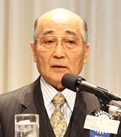��Rotary Awareness Month�� Meeting
Basic Spirit of Rotary -Quoting Words of Paul Harris and Our Forefathers-
January 18, 2012
Mr. Misao Ueno
Past Governor, RI District 2580
(Tokyo Edogawa RC)
 ��Paul Harris, founder of Rotary, once stated ��should I be questioned what Rotary is, my immediate answer would be ��tolerance��.�� He also stated ��how wonderful it would be for people of different religions to sit at the same table called ��Rotary��.�� I believe Paul Harris encouraged us to put ourselves in the places of others and base our service activities on that spirit.
��Paul Harris, founder of Rotary, once stated ��should I be questioned what Rotary is, my immediate answer would be ��tolerance��.�� He also stated ��how wonderful it would be for people of different religions to sit at the same table called ��Rotary��.�� I believe Paul Harris encouraged us to put ourselves in the places of others and base our service activities on that spirit.
��British historian Arnold Toynbee (1889-1975) said ��intolerance underlies Christian civilization and the modern Western civilization, its fruit.�� Judaism, Christianity and Islam are all monotheistic religions, thus being exclusive and intolerant in nature. Indian philosophy, in contrast, regards the world as ��unity between the source of all creation (Brahman) and self-existent soul (atman).�� The fundamental principle of Mahayana Buddhism is ��all creatures possess Buddha nature and benevolence.�� Everything in this world is interdependent, bound by the common life and nature of Buddha.
��Paul Harris clarified that ��Rotary is not and should not replace religion. Our service activities aim to adopt and conduct ethical concepts that have existed from ancient times, especially in our vocational life in the modern society.�� There are two major points of clarification. Firstly, Rotary is not a religion that demands self-denial, but it is an ethics that approves the ��self,�� while asking to ��be altruistic and restrain self-interest.�� Secondly, vocational service is emphasized as priority, so that we can ��adopt and conduct ethical concepts in our vocational life.��
��In 1935, Paul Harris made a stopover in Japan on his way to the 5th Pacific District Conference. During his stay, a Japanese Rotarian questioned him why he had founded Rotary, to which he answered ��because I was lonely.�� He also recollected: ��Although I had many acquaintances through practicing law, I had no true friends.��
��Free competition intensified in the US during the early 20th century and drove capitalists to be obsessed with money with virtually no business ethics. In March 1905, Paul Harris founded the Rotary Club in Chicago, where members from different occupations would gather regularly at weekly meetings to deepen friendship, regain humanity and build reciprocal relationships by learning from each other. During the following years, the spirit of friendship was sublimated to social service activities, especially vocational service.
��Paul Harris stated that ��one of the greatest obstacles against the ideal of service is worship of wealth.�� Japan has become an economic superpower, rising from the ashes after the War in just 40 years. Yet have we become decent, like the saying goes ��well fed, well bred��? Unfortunately, I keep hearing disturbing news of criminal acts conducted by political, business or educational leaders or cruel acts in the family. Modern society puts science and economy ahead of all else, and that is exactly why I believe the Rotarians must follow the teachings of Paul Harris on business ethics.
��Rapid advancements in the technology and capitalist economy since the 1980s have given significant impact on the Rotary service activities:
1) As capitals get converged and systematized, management executives tend to put corporate profits before business ethics advocated by Rotary.
2) As many smaller businesses get indirectly controlled by large companies, it is becoming increasingly difficult to implement vocational services based on the principle of ��I Serve.��
3) Competitive society generates the economically disadvantaged people. As the governments have come to provide welfare programs to them, social service activities are playing a minor role.
4) Capitalist economy transcends national boundaries and is expanding to a global level. Rotary International is shifting its direction towards humanitarian assistance, mainly through the Rotary Foundation.
��Rotary International aims to provide assistance to each club in promoting vocational service activities. Each club implements the 5 Avenues of Service, including vocational service, based on the Guiding Principles of Rotary International and each Rotary Club. An individual Club voluntarily selects its service activities and does not get orders or restrictions from Rotary International. Each Rotarian is expected to have a correct understanding of Rotary Guiding Principles, advocate the basic spirit of vocational service and strive for its implementation, while exerting autonomy of each club.
��Before closing, let me express my sincere gratitude to Tokyo Rotary Club for making significant donations to areas damaged by the Great East Japan Earthquake, which spread over 7 Rotary districts. Governors�� Association called for donations and raised 300 million yen in just 3 weeks after the Earthquake, of which 123 million yen have been allocated to disaster-hit areas. On July 1st we handed over the donations totaling 870 million yen raised during Rotary Year 2010 and the projects discussed at the Governors�� Association to the new Association of Rotary Year 2011.
��Our district, together with 10 other districts and 1 support organization, have launched the 450-million-yen ��Rotary Winds of Hope Scholarship Program�� to provide 50,000-yen-monthly-scholarships over 4 years (over 8 academic terms) to about 50 Earthquake orphans studying at universities and technical schools. I believe that this educational assistance best reflects the spirit of Mr. Umekichi Yoneyama and therefore is the most befitting service activity for this district.